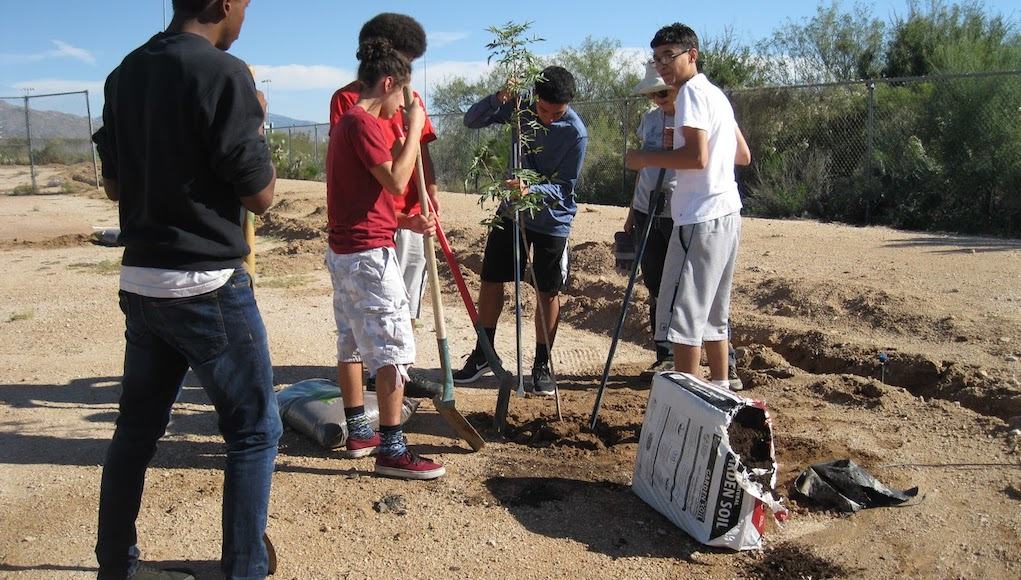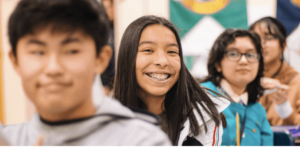Celebrating #EdCorpsWeek: How Student Entrepreneurs Are Contributing

By Elyse Burden
“We had this funny idea that given the space and resources to ship their work and ideas out into the world, students could craft amazing things, figure out what they’re interested in, and ultimately, change their communities – right here, right now.”
….
Most days, there is no single or prescribed way for me to tackle the things I need to get done. Keeping up with loved ones, staying healthy, leading a growing organization – it’s up to me to decide the best way to do my best work with my current resources. Or as Teddy Roosevelt might say, my goal is to do what I can, with what I have, where I am. I think most people are in the same boat.
Somewhere along the way, we collectively (and unconsciously) started crafting educational experiences that did not really reflect this notion. Rather than making decisions for themselves, we decided young people could only do what they were taught or told – and they definitely weren’t supposed to be participants in the ‘real world’ until they graduated. As a result, we teach students that the world is full of right answers that they can obtain and use one day, in the distant future.
The problem is that students are not buying it.
With access to endless information and the ability to contribute to the global community with a single swipe, many young people know their success will be based on their ability to get their hands dirty, use their own hustle and creative problem-solving skills, and do work that matters to them, right now.
At Real World Scholars, we started with the mission to get money into the hands of students to engage in entrepreneurship. We had this funny idea that given the space and resources to ship their work and ideas out into the world, students could craft amazing things, figure out what they’re interested in, and ultimately, change their communities – right here, right now. As we prepare for National EdCorps Week, we wanted to highlight just a few of the 200+ student-led businesses (and likely many more we can’t wait to learn about) running all around the country, using entrepreneurship to connect with the world beyond the classroom.
Santa Rita Sprouts
Josh Ruddick, the teacher behind Santa Rita Sprouts in Tucson, AZ, started teaching five years ago after a career in the healthcare industry – which explains why he treats his students like stakeholders who share a common goal. With access to a hydroponics setup, Josh’s students, who attend a school with plummeting enrollment and limited resources, decided to utilize their the system to grow vegetables and other botanicals. These students are now creating and selling soaps made with the herbs that they grow in class. When considering what retail locations might be candidates to stock their product, they began using Geographical Information Mapping (GIS) to overlap potential locations and disposable income. But the students wanted to do more than sell soap and sprouts. That’s why this fall they’re working to resurrect a local community garden to help provide fresh produce to the community around the school (which also happens to be a food desert). They even plan on building an app that will inform local residents about available inventory. These students aren’t waiting until they graduate to take ownership of their community and their ability to impact it.



In Oceanside, CA, veteran educator Aaron Grable wanted to be more than the “sage on the stage,” handing out information for students to blindly absorb. While Aaron has taught web design for years, he felt previous classes lacked the relevance that students needed. That’s why this year he and his students started 25 Designs, a student-run web design company servicing local businesses. Students started their business, learning the ropes of web design while building their website, designing their business cards, and more. After about two months, the students were stumped. They had checked all of the appropriate boxes and yet still had no customers. They were ready to give up, until they realized that the tension that they were experiencing was the entrepreneurial process – cycles of challenge, strategic problem solving, and situations that lacked a prescribed recipe for success. They realized that while they had built the pipeline, they hadn’t done the uncomfortable work of turning on the proverbial customer faucet. They went back to the drawing board and crafted eight different ways to increase visibility and connect with potential customers. Within a week, the business had eight new clients. Students learned that, much like the rest of life, success required creativity, persistence, and a willingness to embrace discomfort.
Anne Marie Corgill, 2015 Alabama Teacher of the Year, has always put an emphasis on both writing and kindness in her elementary school classroom. This past January, her students co-authored and published Wishes for the World as a way to empower others to spread kindness in their community. Each page, authored and illustrated by individual students, included their wishes for the world. Wishes encourage people to share “their cookies and computers” and reminded people that you don’t have to be the same color as someone else to be friends. Along the way, students who have previously had challenges both in and out of the classroom, have learned that “they are talented artists” and that their gifts and voice are important to the rest of the world. Anne Marie’s first grade students are proud to share that “[they] are starting a business and that [they’re] going to change the world.”



Every day, I have the opportunity to use the fullest extent of my abilities to accomplish my goals and to contribute to the world around me. At present, there are more than 50 million students enrolled in schools around the country who are not given this same opportunity. That’s more than 50 million minds full of curiosity, creativity, and brilliance that could contribute to our communities – right now.
How much longer will we wait to empower them to not only share their sprouts and computers but also to unleash their talents and ideas with the rest of world?
Elyse Burden is co-founder of Real World Scholars. To learn more about the EdCorps Community and the power of youth entrepreneurship, follow #EdCorpsWeek during National EdCorps Week (May 15-19). You can also visit www.realworldscholars.org/edcorpsweek to learn more.
For more, see:
- 9 Global Schools Promoting Entrepreneurship and Leadership
- Smart List: 35 Organizations Connecting & Supporting Entrepreneurs
- Entrepreneurship Education Reimagined
Stay in-the-know with all things EdTech and innovations in learning by signing up to receive the weekly Smart Update.




0 Comments
Leave a Comment
Your email address will not be published. All fields are required.